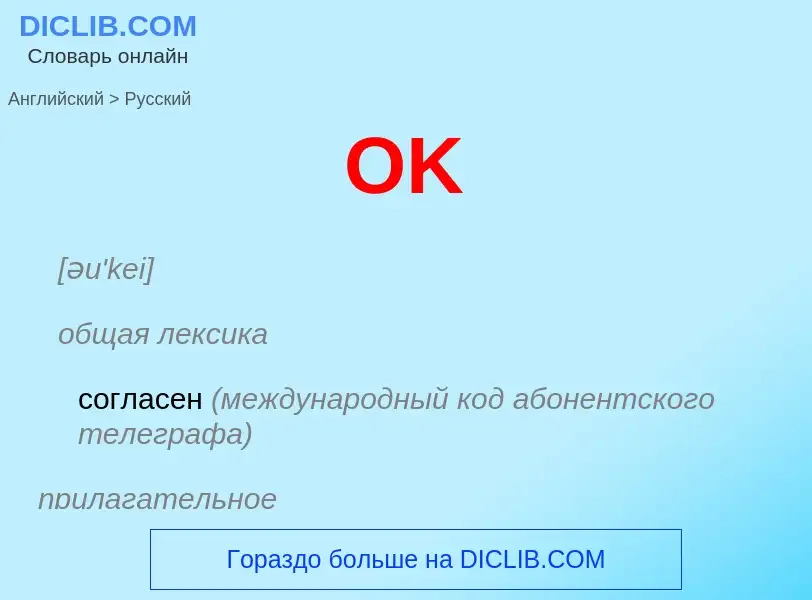Tradução e análise de palavras por inteligência artificial ChatGPT
Nesta página você pode obter uma análise detalhada de uma palavra ou frase, produzida usando a melhor tecnologia de inteligência artificial até o momento:
- como a palavra é usada
- frequência de uso
- é usado com mais frequência na fala oral ou escrita
- opções de tradução de palavras
- exemplos de uso (várias frases com tradução)
- etimologia
OK - tradução para russo
[əu'kei]
общая лексика
согласен (международный код абонентского телеграфа)
прилагательное
[əu'kei]
общая лексика
исправный
подходящий
приемлемый
не вызывающий возражений
разговорное выражение
всё в порядке
хорошо
ладно
правильно
междометие
общая лексика
хорошо!
ладно!
идёт!
есть!
слушаюсь!
будет сделано!
существительное
[əu'kei]
разговорное выражение
одобрение
санкция
согласие
разрешение
глагол
[əu'kei]
общая лексика
(OK'd ‹-{əu'kei}d›) [разг.] одобрять
утверждать
давать согласие
получить одобрение
[əu'kei]
синоним
[əu'kei]
синоним
наречие
общая лексика
все в порядке, хорошо
утверждено, согласовано
правильно, в исправности
синоним
Wikipédia

OK ( (listen); spelling variations include okay, O.K., ok and Ok) is an English word (originating in American English) denoting approval, acceptance, agreement, assent, acknowledgment, or a sign of indifference. OK is frequently used as a loanword in other languages. It has been described as the most frequently spoken or written word on the planet.
OK's origins are disputed; however, most modern reference works hold that it originated around Boston as part of a fad for misspelling in the late 1830s, and originally stood for "oll korrect [all correct]". This origin was first described by linguist Allen Walker Read in the 1960s.
As an adjective, OK principally means "adequate" or "acceptable" as a contrast to "bad" ("The boss approved this, so it is OK to send out"); it can also mean "mediocre" when used in contrast with "good" ("The french fries were great, but the burger was just OK"). It fulfills a similar role as an adverb ("Wow, you did OK for your first time skiing!"). As an interjection, it can denote compliance ("OK, I will do that"), or agreement ("OK, that is fine"). It can mean "assent" when it is used as a noun ("the boss gave her the OK to the purchase") or, more colloquially, as a verb ("the boss OKed the purchase"). OK, as an adjective, can express acknowledgement without approval. As a versatile discourse marker or continuer, it can also be used with appropriate intonation to show doubt or to seek confirmation ("OK?", "Is that OK?"). Some of this variation in use and shape of the word is also found in other languages.



